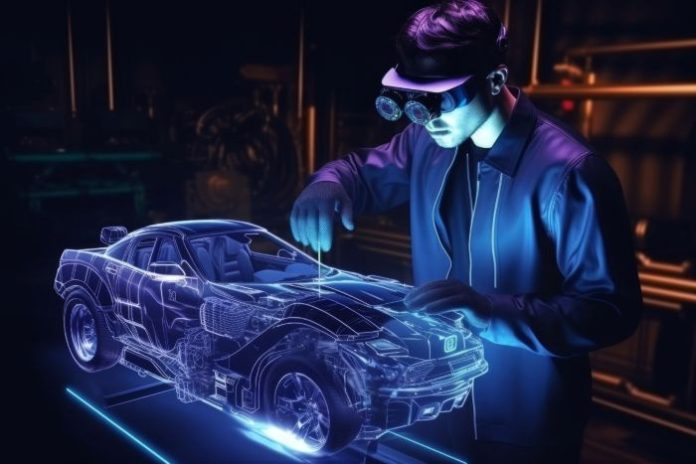The used car industry is undergoing a digital transformation that’s reshaping how vehicles are evaluated, priced, and sold. At the forefront of this revolution is artificial intelligence-powered vehicle inspection technology, which is rapidly replacing traditional manual assessment methods with automated, precise, and cost-effective solutions.
Table of contents
The Current State of Vehicle Inspection Technology
Traditional vehicle inspections have long been problematic for the automotive industry. Manual inspections typically cost between $50-$200 per vehicle for consumers, whilst companies invest $60,000-$70,000 annually for a full-time inspector. These processes are time-consuming, subjective, and prone to human error.
AI-powered inspection systems are transforming this landscape. Companies like Self Inspection, which recently raised $3 million in seed funding, have developed smartphone-based solutions that generate comprehensive vehicle condition reports in minutes. The technology leverages computer vision algorithms trained on over 30 million images to detect everything from minor scratches to complex mechanical issues with 95-99% accuracy.
UVeye, the market leader that secured $191 million in funding in January 2025, describes their systems as an “MRI for vehicles,” scanning all visible vehicle components in seconds.
Computer Vision: The Technology Behind the Revolution
The backbone of AI-powered vehicle inspection lies in advanced computer vision technology. These systems use sophisticated algorithms to analyze images and videos of vehicles, identifying patterns that indicate damage, wear, or mechanical issues. Unlike traditional methods, AI systems maintain consistent accuracy regardless of conditions.
Advanced Damage Detection Capabilities
Modern AI inspection platforms can detect over 21 types of damage across metal, plastic, fiber, glass, and rubber components. The technology assesses severity levels, generates repair cost estimates, and identifies fraudulent claims.
Machine Learning and Continuous Improvement
The technology’s continuous learning capability means systems become increasingly accurate at identifying subtle issues as they process more inspections.
Economic Impact and Market Growth
The AI vehicle inspection market is experiencing explosive growth. Industry analysts project the global market will reach $6.9 billion by 2033, riding on a strong 15.8% compound annual growth rate. This growth is driven by increasing demand from car rentals, fleet management, insurance companies, and used car dealerships.
McKinsey research indicates that AI applications in the automotive industry represent “a substantial, industry-wide, artificial intelligence-enabled opportunity that by 2025 could reach an annual value of about $215 billion for automotive OEMs worldwide.” This corresponds to nine percentage points of earnings before interest and taxes for the entire automotive industry.
For dealerships, AI inspection systems can reduce assessment time from hours to minutes, enabling faster inventory turnover and improved customer satisfaction.
Real-World Applications and Success Stories
Several automotive companies have demonstrated the transformative power of AI-powered inspections. Liberty General Insurance has automated vehicle inspections for policy renewals, significantly reducing processing delays.
UK Market Adoption
Progressive dealerships across the UK are embracing these technologies. For example, forward-thinking used car dealers offering cars for sale Wakefield are exploring AI inspection platforms to enhance customer experience and streamline operations. These early adopters find the technology improves efficiency whilst providing competitive advantages.
Smartphone-Based Solutions
Smartphone-based solutions represent a significant development. Companies like Self Inspection and Monk AI have created platforms that turn any smartphone into a sophisticated inspection device. Users receive a text or email link and follow step-by-step guidance to capture vehicle photos.
Real-Time Analysis and Reporting
The AI analyses these images in real-time, providing immediate feedback. Within minutes, users receive comprehensive condition reports including repair estimates.
Democratizing Professional-Grade Technology
This democratization particularly benefits smaller dealerships who previously couldn’t afford sophisticated assessment tools.
Addressing Industry Challenges
AI-powered inspection systems address persistent industry challenges. Fraud detection capabilities help identify vehicles with hidden damage or manipulated histories by analysing photos and detecting inconsistencies.
Ensuring Consistency and Transparency
Traditional inspections vary significantly between inspectors, leading to pricing discrepancies and disputes. AI systems provide standardized, reproducible assessments that reduce conflicts and improve transparency.
Regional Success Stories
Similar adoption patterns are emerging across northern England, with dealers specializing in used cars Newcastle also implementing AI-powered assessment tools to differentiate themselves in competitive markets. The technology enables these dealerships to provide transparent, detailed vehicle reports that build customer trust.
The Future of Vehicle Assessment
The future points toward more sophisticated capabilities including 3D scanning, thermal imaging, and blockchain integration for immutable vehicle records.
For used car dealers, AI-powered inspection represents both opportunity and necessity. Early adopters gain competitive advantages through faster processing, improved customer trust, and reduced costs. Investment requirements have decreased as smartphone-based solutions eliminate expensive hardware.
AI-powered vehicle inspections are transforming the used car industry, providing unprecedented accuracy, efficiency, and transparency. Dealerships embracing AI inspection systems will be better positioned to compete in an increasingly digital automotive marketplace.











